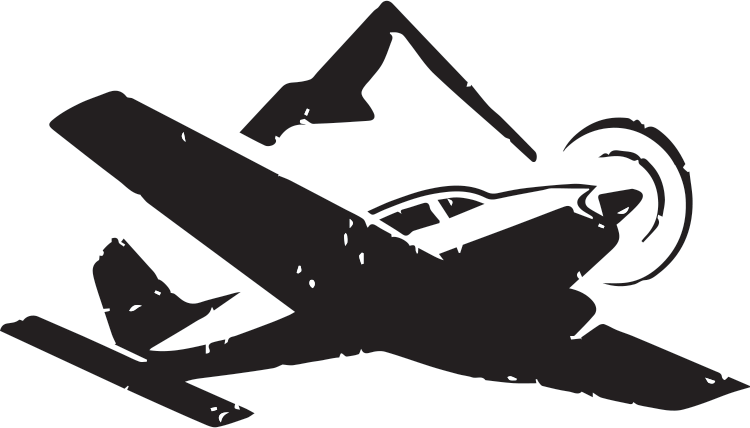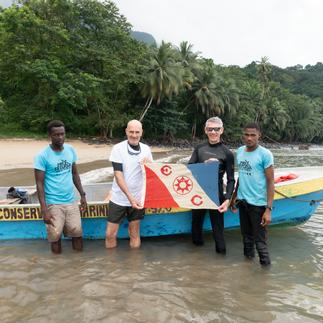Field Report in São Tomé
- flightaroundtheglobe.com

- Feb 5, 2024
- 3 min read
Updated: Apr 13, 2024
Voyage Around the World Of the "Spirit of St Exupery" January-June 2024
São Tomé, January 24-28th, 2024
We reached São Tomé after de departure 3 days prior from Montreal, flying over the North Atlantic, the Azores, the Canary Islands, Senegal, and Ivory Coast. The PC-12 performed like clockwork, and the weather also cooperated, aligning perfectly for the start of our expedition.
São Tomé, a small country in the Gulf of Guinea, gained independence from Portuguese rule in 1975. Comprising of two main islands, São Tomé and Principe.
The Gulf of Guinea was explored by the Portuguese, who took control of it, but it these islands historically remained off the routes of major European explorations of the 17th and 18th centuries rounding the Cape Horn, as ships would rather stop in Brazil.
For the "Spirit of St Exupery," a stopover was necessary before crossing the South Atlantic, following a refuelling in Assumption.
During this stop, we connected with Hughes and Christian, founders of the NGO "Over the Swell," responsible for the William Mission in the Gulf of Guinea. We spent four days with them before continuing our journey to the island of St. Helena.
The Mission William objective is to establish the world's first protected offshore corridor between the Gulf of Guinea and St. Helena, to safeguard migratory marine megafauna in the Southeast Atlantic.

Hugues and Christian explained with fervor how the Gulf of Guinea faces illegal industrial fishing, causing ecosystem destruction and fishery resource depletion.
We meet with the director of the Ministry of Fisheries, who point out their helplessness against illegal fishing: they have no navy, no means to protect their territorial waters… so trawlers from around the world cast their nets and captures everything that comes their way. Sharks, especially whale sharks, are sold in Asia. São Tomé don’t have any Marine Protected Area (MPA), and therefore no access to any funding.
The Mission William initiative also aims to demonstrate the existence of a migratory current of megafauna, including whale sharks, between São Tomé and St. Helena. According to the assessment from International Union for Conservation of Nature (IUCN) in 2016, the world population had reduced by 50% over the past 75 years. Now, their population does have the potential to recover with concerted and sustained efforts.
Collaborating with of two local NGOs, Marapa and Fundacao Principe, Hughes and his teams identifies and tags whale sharks to track their migration. A consortium with the Cape Verde Islands and Gabon has been created to enhance their influence in discussions with international bodies. They are supported by the Blue Marine Foundation (UK), Fondation de la Mer (France), and Fondation du Vent des Globes (France), as well as Shark Project (Switzerland).
The canoe and the team of the conservation effort posing with us and the Explorer’s Flag. A whale shark tag on the beach. Diving with a shark whale, credit photo to Hugues from Over the Swell.
We then set sail with fishing divers for numerous snorkeling dives at about ten sites around the two islands. The absence of findings is alarming. There is no marine life left! The combination of illegal industrial fishing and artisanal fishing with dynamite or drift nets has destroyed all habitats.
The Mission William initiative also includes an educational component. First, they’re raising fishermen’s awareness to marine conservation. Every fisherman met along the way is given an explanation about whale sharks and ocean protection. They receive a laminated document, and surprisingly, it works!

Second, education of the youth. We then visited a school to raise awareness about their ocean and its resources that they do not know much about. We talk to them about our expedition. They are thrilled to see São Tomé on a map that goes around the world.

São Tomé, a small country, a little forgotten by the world, also faces a rampant youth emigration to Europe, with no means to defend its marine capital! Good wind to all those who, with passion and determination, are fighting alongside them to have their rights recognized.
About Sao Tomé
Geography: Two islands, São Tomé and Príncipe, along with several smaller islets are very close to the equator. It is known for its lush tropical landscapes, volcanic terrain, and cocoa plantations.
Population in 2023: 231,856
Principe Island has been witness to an historic event: the proving by Sir Arthur Eddington of Einstein’s predictions of bending of light in a gravitational field in 1919. Learn more in this article: https://www.transcontinentaltimes.com/einsteins-theory-proven-right-in-sao-tome-and-principe/à
Language: Portuguese is the official language, reflecting the country's colonial history. However, Forro, a creole language, is widely spoken among the local population.
Political System: São Tomé and Príncipe is a democratic republic with a multi-party political system. The President of the Republic is both the head of state and government.
References:
Womersley, Freya C et al. “Global collision-risk hotspots of marine traffic and the world's largest fish, the whale shark.” Proceedings of the National Academy of Sciences of the United States of America vol. 119,20 (2022): e2117440119. doi:10.1073/pnas.2117440119
The IUCN Red List of Threatened Species ISSN 2307-8235, Assessment by Pierce, S.J. & Norman, B. 2016, P. 5. Retrieved Feb. 2, 2024.









Comments